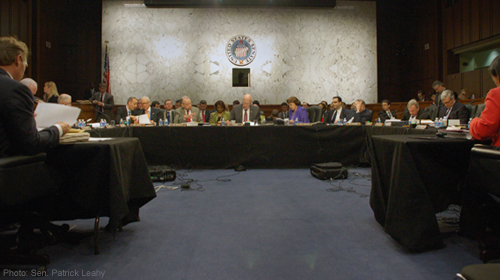
The immigration reform bill that has emerged from the Senate Judiciary Committee is good – not ideal, not awful, but good. It is a game changer for those who currently have no hope of realizing the Constitution’s promise of equal protection. But it also creates real risks to privacy for all Americans regardless of status and expands the kind of database environment that many of us fear will give the government access to far too broad a swath of our lives. And the bill creates the kind of militarized environment along our southern border that is extremely costly, harmful to border communities’ quality of life, and enormously inefficient. And we must not forget that some are wrongly excluded from even a chance at the fruits of immigration reform – beginning with those who happen to love someone of the same sex.
As the bill moves to the full Senate for further consideration next week, we can find clues of upcoming changes in what just occurred in the Committee. Dozens of amendments were withdrawn before they could be voted upon – many of them will return on the floor where the numbers are less certain and more malleable. Some of the fights on the floor will be continuations of the skirmishes previewed in committee. We will certainly see an effort to curtail judicial discretion and the flexibility of administrative waivers. There will be attempts to further narrow the breadth of the path to citizenship – some will want to exclude those with minor offenses. But rest assured that the fight will continue to broaden the reach of the bill, too. We and others will look to expand protections against profiling and provide a modicum of hope to those with criminal convictions when special circumstances exist. And it would be nice to believe that the full Senate might vote to extend the rights of married couples to those who are in same-sex marriages BEFORE the Supreme Court tells them current law is unconstitutional, as we hope it does.
So now that you get a general gist of where we’re at, here’s a list of the highlights and lowlights of the bill as it emerged out of committee:
- Path to citizenship. First and foremost, the bill creates a pathway to citizenship for the great majority of the 11.5 million undocumented immigrants currently living in the U.S. Legalization of these aspiring Americans will help restore fairness to the immigration system by putting an end to the cycle of mass deportation, and will bring these individuals into a state of equality in American society – with all of the attendant benefits and responsibilities. To the great dismay of some on the Committee, however, immigration reform is closed to same-sex spouses even though open to opposite-sex spouses in precisely the same circumstances.
- Mandatory employment verification. The nationwide E-Verify system mandated by the bill raises the specter of a national ID system and generates risks to fundamental privacy rights of all workers. The error-prone systems endanger the rights and livelihood of everyone in U.S. workplaces and in civic life – both those who will be brought into the lawful workforce and those already there. On the bright side, amendments offered by Sen. Franken (D-Minn.) offer hope for improving accuracy and providing support for small businesses that will need to cope with this new federal mandate. And the underlying bill includes new and valuable due process protections.
- Border militarization. The original bill called for a broad expansion of law-enforcement presence on the Southwest border, focusing especially on high-risk areas. The amendment process doubled down on militarizing the border and extended heightened law-enforcement presence to all sectors. There were some significant but limited restrictions imposed on the domestic use of drones in the southern California border area.
- Flexibility and review. While there were some modifications, the Committee retained the original bill’s basic trust in a system that relies on the wisdom and flexibility of judicial review of adverse legalization decisions and in the discretion to afford waivers based on unique individual circumstances where a blanket rule would run the risk of creating unfair and harsh results. That being said, the bill also lays down a hard line against those with felony convictions or three misdemeanors – and largely excludes such individuals from an adjustment to lawful status. Such a black-and-white system is never fair and should be modified. And more needs to be done to provide judicial review in deportation cases.
- Right to counsel. The bill endorses the concept that justice demands that those who are unable to represent themselves – children and individuals with certain mental disabilities – must have appointed counsel in immigration proceedings.
- Prompt bond hearings. The Committee fought off attempts to strip provisions that provide for prompt bond hearings for those in detention by immigration authorities, hearings that are cost-effective and fundamental to due process.
- Alternatives to detention. The Committee largely retained the original bill’s substantial commitment to alternatives to the massive immigration detention system. While enforcement problems remain – programs like Operation Streamline, Operation Stonegarden, and 287g are still around – a commitment to alternatives to detention is welcome news.
- Discriminatory profiling. The Committee bill includes language barring racial and ethnic profiling by all federal law enforcement officials and provides for data collection. It omits, however, a ban on profiling based on religion and national origin. Also, there are exceptions that allow profiling to be used for national security and border enforcement – exceptions that may swallow the rule. In essence the language codifies the Attorney General’s Guidance Regarding the Use of Race by Federal Law Enforcement Agencies – a document that the ACLU has roundly criticized. The Committee did adopt an amendment offered by Sen. Blumenthal that would allow the Department of Justice to withhold funding for state and local prosecutions along the border which arise from unlawful law enforcement practices, such as profiling. On the ledger’s other side, a damaging Graham amendment was adopted that requires additional screening of aliens, spouses and children who live in regions or countries deemed a threat to national security, including regions or countries that merely contain threatening groups or organizations.
- Solitary confinement. The Committee adopted a landmark Blumenthal amendment that would restrict the use of solitary confinement. This is a significant step forward in detention practices and could have broader implications in the corrections community.
- Dangerous enforcement practices. The Committee adopted an amendment from Sen. Coons (D-Del.) restricting dangerous nighttime deportations. And the Committee adopted a Blumenthal-Coons proposal restricting immigration raids in certain sensitive locations such as hospitals, houses of worship, and schools.
Learn more about immigration reform and other civil liberty issues: Sign up for breaking news alerts, follow us on Twitter, and like us on Facebook.




